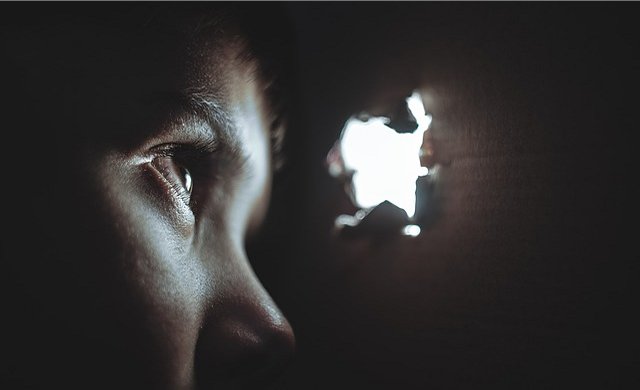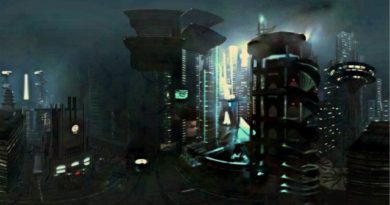The Fair Heavens
The ride to the farm was quiet. Ballard was pensive and mercifully uninterested in either reprimanding or teaching me. An early evening rain had soaked the ground and brightened the air. It was still drizzling when we turned up the neat, dirt road and approached the property. I watched the headlights graze immaculately painted, white fences that bounded into the darkness. The professor had cracked his window, and I buttoned up my cardigan against the unexpected chill. I hoped the Beilers wouldn’t be too disapproving of me wearing pants. I thought we might have a look around their land and that it would be easier for me to move if I wasn’t worrying about a skirt getting caught on a tree branch or a rambling shrub. This was what was on my mind when I heard the screaming.
We had arrived at the front of the house and were rushed by shadows.
“Stop!” came a chorus of voices. A tall, pasty man with a full beard appeared at my window. “Turn off the lights, please!” I could see all of his teeth.
The professor pulled to an abrupt stop, and I lurched forward, slamming my palms against the dashboard. Ballard was having none of the mayhem. “What is the meaning of this?” he shouted the moment he was out of the car. He snatched a briefcase that was sitting between us and slammed the door shut.
“It’s Abram — he’s afraid of the lights,” said Miriam, who was standing only inches away from the Bel Air’s wide grille. “It reminds him of what happened.” There were a few sobs still coming from inside, muffled but audible. Miriam cast a glance to the open door on the front porch. “Come.”
It smelled like wood and soap in the living room. I was happy to be seated on a sofa with big cushions since most of the furniture eschewed comfort. It was a large space and like all Amish homes, it was designed to be big enough to hold religious services for the entire community. So even though there were multiple generations living in the house, there was plenty of room for all. There were elders — both of Levi’s parents joined us and of course, the two children were there, minus Ruth, the oldest, Samuel wore a stoic expression and stood in the corner, eyeing us suspiciously. He was his father’s son.
And then there was Abram. He was small. We were told he was seven but he seemed far younger. I wouldn’t have noticed him had his grandfather, John, not introduced us. Abram was in a shadowy corner, clutching a pencil as his hand moved deftly over a sheet of cheap paper. I could see his shoulder blades rise and fall like clipped wings through his white shirt.
“Abram, this is Kara and Robert. They are here to meet you and help us,” said John who sounded unsure if what he just told the boy was true.
Abram was defiant, his eyes still puffy from tears. He glanced up only for a moment but didn’t look at anyone. “No, no, nonononono….”
“It’s all right,” said Miriam. She approached her son gently and kissed him on top of his head, smoothing his thick, long hair. “You can draw again later. Come, come, my little gees.” Miriam saw me staring as she scooped the boy into her arms. “It means, goat. He is stubborn. But he is a good boy. A wonderful gift from God.”
Ballard looked up from his open briefcase and grunted as he shot a frown at Abram. “This is our star witness? I’ve heard about children like him before. Schizophrenic, or some such. I hope he can answer detailed questions,” he said as he pulled out a clipboard.
“I would ask that you be kind to him,” Levi said. He was a big, ginger-haired man with hands the size of baseball mitts, the one who had charged the car when we arrived.
The professor ignored him. “Let’s begin,” he said as he checked his watch and marked the time. “First, I’ll speak with you as a group so I can get your basic information, and then I’ll meet with you one at a time. Miss Porter, you will take notes throughout these interviews.” He summoned me to him and handed me a steno pad and a pen. “You’re job is to look busy,” he whispered. “But leave the actual work to me. Say nothing.”
Ballard’s questions were rapid-fire and precise. Admittedly, I was impressed by the breadth and depth of his investigation, though he was condescending throughout. It’s true however, that he already knew a great deal about the night of May the 27th because he had taken a thorough witness statement from Peter McNowski and this was, apparently, the same phenomenon. Still, he needed to find out if the Beilers’ story had any credibility because it would bolster the initial sighting. Barring that, it had to be thoroughly debunked. And that was a task I knew he would relish.
Ballard tore through the names, ages, genders, and occupations — such as they were — of all those present during the events, two evenings before. He then dismissed all but one person from the room so he could launch into the specifics. This would help ensure to some degree that the witnesses weren’t feeding answers to each other in order to create a coherent story. So, one after the other, each family member answered questions about the location of the craft, its distance from the viewers, the weather at the time, the nature of any obstructions that diminished the view, the height relative to various landmarks, and the ship’s apparent size and its color or colors.
There were inquiries into its brightness, its light sequences, its peculiarities of movement in every detail: Did it turn abruptly? No. Hover? Yes. Leave a trail? Dissolve? Ascend? Descend? No/No/Yes/Yes. Make a sound? Make more than one sound? Eject other objects? Wobble? Have fuzzy edges? Have an outline? Pulsate? Appear solid?
“It looked like a star. No noise at all. Quiet as a moth,” said Martha, Levi’s mother, during her one-on-one interview. “We first saw it a little after dark.”
“I was amazed,” John, her husband, told us. “I couldn’t stop staring. And then it was gone.”
“I heard Abram crying. That’s the first thing I remember,” said Samuel. “The ship had gone away, and it was dark.” He glared at me while he answered questions. Little big man.
“We ran upstairs because we could hear Abram,” Levi told us. He showed little emotion during his interview but he tugged at his beard over and over again. “He was sitting in the middle of the room, and he was crying. He pointed at the window and the wall and hollered.”
Miriam’s fingers played around the edges of her mouth for most of her questioning. “Ruth’s bed was cold. I could see the place were she had been sleeping, there was a little indentation in the mattress.”
“What time?” Ballard sighed. He had asked everyone but so far, no one had been able to answer him with any accuracy. An Amish household was without clocks, and their wardrobes certainly didn’t include wristwatches.
“We live on His time and that cannot be measured by a machine,” Martha had told us earlier with a trace of irritation.
Miriam surprised us though. “It was after eight o’clock. I could tell by the sky — by the Big Dipper and the Guiding Star. My father taught me how.”
The professor narrowed his eyes. “After eight. So, what happened between the time you first saw the light and discovered Ruth was missing?”
Miriam said nothing and shook her head. She had small, brown eyes but in that moment, I recall thinking they seemed huge: two planets undergoing worldwide earthquakes.
“All I know was that I was at the window, shocked. And then it was over. It seemed very fast — maybe just a few minutes — but then I saw that our gaslights had gone out, and Levi was pulling at my sleeve. We ran upstairs in the dark.”
Ballard paused and drummed his pen against his thick, ream of forms. “This is most irregular, Mrs. Beiler. The sun set at twenty past seven that night, and you’re telling me you stared at a light in the sky more than half-an-hour and noticed nothing else at all while your daughter disappeared.”
Click below to read on…




